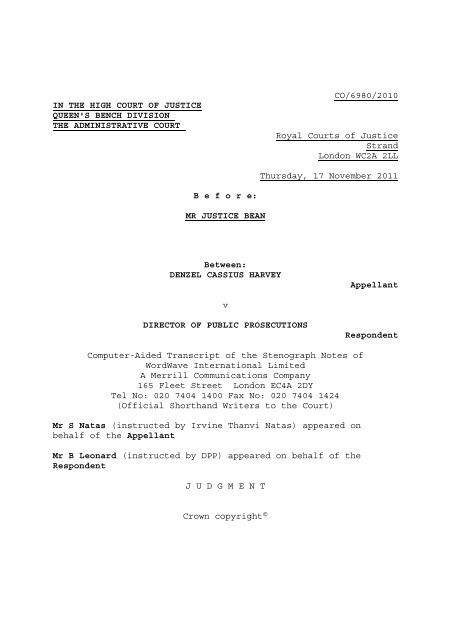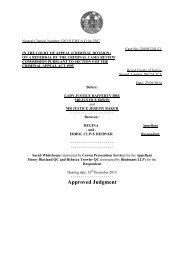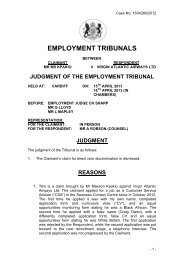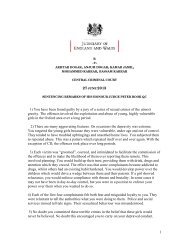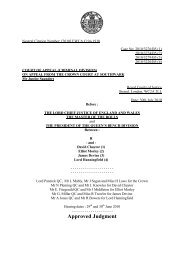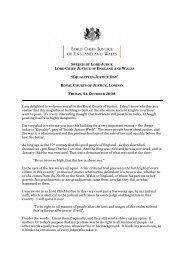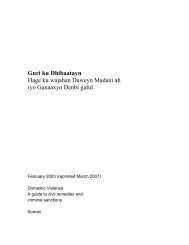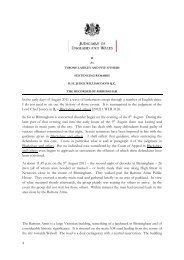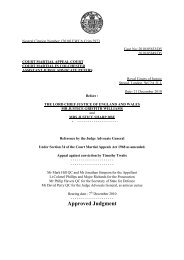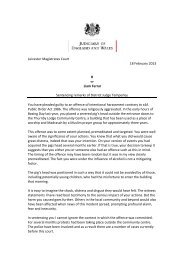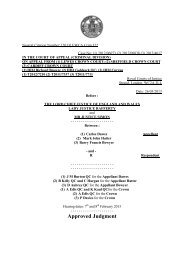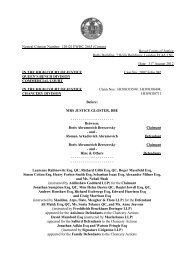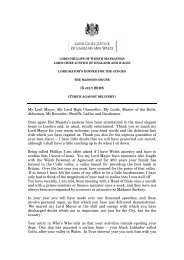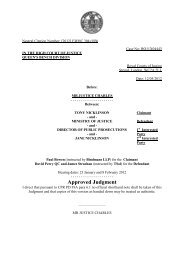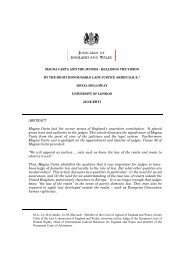Daniel Harvey -v- dpp - Judiciary
Daniel Harvey -v- dpp - Judiciary
Daniel Harvey -v- dpp - Judiciary
Create successful ePaper yourself
Turn your PDF publications into a flip-book with our unique Google optimized e-Paper software.
IN THE HIGH COURT OF JUSTICE<br />
QUEEN'S BENCH DIVISION<br />
THE ADMINISTRATIVE COURT<br />
B e f o r e:<br />
MR JUSTICE BEAN<br />
Between:<br />
DENZEL CASSIUS HARVEY<br />
v<br />
DIRECTOR OF PUBLIC PROSECUTIONS<br />
CO/6980/2010<br />
Royal Courts of Justice<br />
Strand<br />
London WC2A 2LL<br />
Thursday, 17 November 2011<br />
Computer-Aided Transcript of the Stenograph Notes of<br />
WordWave International Limited<br />
A Merrill Communications Company<br />
165 Fleet Street London EC4A 2DY<br />
Tel No: 020 7404 1400 Fax No: 020 7404 1424<br />
(Official Shorthand Writers to the Court)<br />
Mr S Natas (instructed by Irvine Thanvi Natas) appeared on<br />
behalf of the Appellant<br />
Mr B Leonard (instructed by DPP) appeared on behalf of the<br />
Respondent<br />
J U D G M E N T<br />
Crown copyright©<br />
Appellant<br />
Respondent
MR JUSTICE BEAN: On 10 March 2009, at Bradstock Road, London<br />
E9, PC Challis and PCSO Mr Mcllvaney were looking for people<br />
who, the police had been informed, might be in possession of<br />
cannabis. They found one young woman and three young men,<br />
including the appellant, Denzel Cassius <strong>Harvey</strong>, outside<br />
a block of flats. The officers decided to search the three<br />
men. Mr <strong>Harvey</strong> objected and said, "Fuck this man, I ain't<br />
been smoking nothing". PC Challis told him that if he<br />
continued to swear he would be arrested for an offence under<br />
section 5 of the Public Order Act 1986. PC Challis searched<br />
the appellant but found no drugs, whereupon the appellant<br />
said, "Told you, you won't find fuck all". The officer<br />
again warned him about swearing and proceeded to search the<br />
other two men. A group of young people had gathered around<br />
them. The officer next used his radio to carry out a name<br />
search to see if any of the group was wanted by the police.<br />
He asked the appellant if he had a middle name and the<br />
appellant replied, "No, I've already fucking told you so".<br />
The officer arrested Mr <strong>Harvey</strong> for the offence under<br />
section 5.
A struggle ensued during which PC Challis alleged that the<br />
appellant assaulted him. The appellant was in due course<br />
charged, firstly with assault on a police officer in the<br />
execution of his duty, and secondly with using threatening,<br />
abusive or insulting words or behaviour contrary to<br />
section 5 of the 1986 Act. He was convicted on the latter<br />
charge and fined £50. He was acquitted on the charge of<br />
assault. I mention it as part of the history because some<br />
people learning of this appeal by way of case stated from<br />
the conviction might wonder whether it was a wise use of<br />
scarce resources for him to have been prosecuted under<br />
section 5 in the first place, had that charge stood alone;<br />
but it came before the magistrates accompanying the much<br />
more serious one of assault on the constable.<br />
The prosecution relied on the three incidents of swearing in the<br />
exchanges to which I have referred. Such language is<br />
familiar to most courts. A search on the legal database<br />
Lexis for cases in which either the word "fuck" or the word<br />
"fucking" appear produces 2,124 results. Even allowing for<br />
duplication in the way that cases are reported and<br />
transcribed, or for cases which appear in more than one<br />
report, the total is still very large. Fortunately Mr Natas<br />
for the appellant, and Mr Leonard for the respondent, in<br />
their concise and helpful submissions, only found it
necessary to cite six of the many cases which bear on this<br />
vexed topic. They show a clear line of authority.<br />
It is important to note that before the magistrates neither<br />
officer gave evidence of having been harassed, alarmed or<br />
distressed. The nearest anyone came to this is that PC<br />
Challis was asked if the word "fuck" justified an arrest and<br />
replied that it depends on the circumstances, but here it<br />
was said loudly and clearly. Nor was there evidence of<br />
anyone else having been harassed, alarmed or distressed. In<br />
paragraph 5 of the case stated, the justices wrote:<br />
"We were of the opinion that the offence under<br />
Section 5 of the Public Order Act 1986 had been<br />
proved. We believed that this was a public area in<br />
the middle of a block of flats: there were people<br />
around who do not need to hear frightening and<br />
abusive words issuing from a young man. It was not<br />
only the words but the tone in which they were said<br />
which causes alarm."<br />
As Mr Leonard observed in his submissions for the prosecution,<br />
the last two sentences are ungrammatical, and the mixture of<br />
the present tense and past tense makes it difficult to say<br />
whether these were findings of facts or general<br />
propositions.<br />
The justices went on to state three questions for the opinion of<br />
this court:<br />
"(i) As part of the reason for the decision that<br />
Denzel <strong>Harvey</strong> had committed the offence alleged
under Section 5 of the Public Order Act 1986, were<br />
the justices entitled to conclude that the use by<br />
the Appellant of the words "Fuck this man. I ain't<br />
been smoking nothing", and "Told you you wouldn't<br />
find fuck all", and "No. I've fucking told you<br />
no", amounted to threatening, abusive or insulting<br />
words and/or behaviour or disorderly conduct?<br />
"(ii) As part of the reason for their said<br />
decision were the justices entitled to conclude<br />
that either Police Constable Challis or Police<br />
Community Support officer Mcllvaney were likely to<br />
have been caused harassment, alarm or distress as<br />
a result of the use by the Appellant of the said<br />
words referred to in (i) above, in the absence of<br />
any specific evidence that either officer felt<br />
threatened by the Appellant's conduct or felt<br />
harassed, alarmed or distressed.<br />
"(iii) As part of the reason for their said<br />
decision were the justices entitled to include that<br />
the bystanders who witnessed the incident or who<br />
may have been in the open area of the flats or<br />
resident in their homes were persons likely to have<br />
been caused harassment, alarm or distress, in the<br />
absence of any specific evidence that such result<br />
was likely." [emphasis added]<br />
A number of cases establish that expletives such as "fuck" or<br />
"fucking" are potentially abusive words, whether the<br />
addressee is a police officer or a member of the public. But<br />
Parliament has not made it an offence to swear in public as<br />
such. The elements of the offence under section 5 (1)(a) of<br />
the Public Order Act 1986 (so far as it relates to words)<br />
are that the defendant used threatening, abusive or<br />
insulting words within the hearing of someone else who was<br />
caused or was likely to be caused harassment, alarm or<br />
distress by hearing them. In DPP v Orum [1989] 88 Cr App
Rep 261 Glidewell LJ said:<br />
"Very frequently words and behaviour with which<br />
police officers will be wearily familiar will have<br />
little emotional impact on them save that of<br />
boredom. It may well be that, in appropriate<br />
circumstances, justices will decide (indeed they<br />
might decide in the present case) as a question of<br />
fact that the words and behaviour were not likely<br />
in all the circumstances to cause harassment, alarm<br />
or distress to either of the police officers. That<br />
is a question of fact for the justices to be<br />
decided in all the circumstances, the time, the<br />
place, the nature of the words used, who the police<br />
officers are, and so on. “<br />
To like effect is the judgment of Fulford J, sitting in the<br />
Divisional Court, in Southard v DPP [2006] EWHC 3449, when<br />
he said that whether the person addressed is a police<br />
officer or a member of the public, the words "fuck you" or<br />
"fuck off" are potentially abusive. Mr Leonard accepts that<br />
there is some distinction between saying "fuck you" or "fuck<br />
off" and the way in which the expletives were used in the<br />
present case, though he submits that the difference is not<br />
decisive, and I agree.<br />
The observations in Southard should be seen in the context of<br />
the facts of that case. The defendant's brother Adam was<br />
stopped and searched by a police officer, PC Richards.<br />
While this search was going on the defendant, Andrew<br />
Southard, approached and swore at PC Richards on two<br />
occasions, interfering with the search. Andrew was
cautioned after the first swearing incident and arrested<br />
after the second. The officer, during cross-examination,<br />
described the situation as follows:<br />
"I felt threatened by [his] behaviour ... by his<br />
actions, by his manner. He was very agitated. He<br />
was verbal……It was his whole course of conduct, his<br />
whole manner. He was very verbal. He was very<br />
agitated. He had become very aggressive".<br />
The Crown Court, from whom the appeal by case stated was<br />
brought, expressed their conclusions in the case thus:<br />
"The court was of the view that PC Richards was --<br />
just -- caused harassment, alarm or distress<br />
thereby and dismissed the appeal."<br />
When they were asked to give reasons, the presiding judge said<br />
this:<br />
"We then considered whether in the particular<br />
circumstances, those words were likely to cause<br />
harassment, alarm or distress. In respect to alarm<br />
or distress our conclusion is no. Harassment, well<br />
considering the fact that PC Richards was having to<br />
deal with the search of another particular<br />
defendant notwithstanding the fact that the closest<br />
you got was some three metres away, we do take the<br />
view that that was likely to amount to harassment.<br />
It follows therefore that we have taken the view<br />
that your behaviour, not by much, crosses the line<br />
and that the offence has been made out."<br />
It is in that context that Fulford J said at paragraph 19 that<br />
the expletives which Mr Southard had used were potentially<br />
abusive, and went on:
"Frequently though they may be used these days, we<br />
have not yet reached the stage where a court is<br />
required to conclude that those words are of such<br />
little significance that they no longer constitute<br />
abuse. Questions of context and circumstance may<br />
affect the court's ultimate conclusion as to<br />
whether, in an individual case, they are abusive,<br />
but on these facts, during an incident in which the<br />
appellant was strongly opposing the detention of<br />
his brother, they were delivered in a situation<br />
which sustainably led the court to conclude that<br />
they were abusive. I stress that the decision on<br />
an issue of this kind will always be fact<br />
dependent."<br />
In R(R) v DPP [2006] EWHC Admin it was held that “distress”<br />
requires real emotional disturbance or upset, and that while<br />
the degree of such disturbance or upset need not be grave,<br />
it should not be trivialised.<br />
The next element of the offence is that the threatening, abusive<br />
or insulting words must have been spoken within the hearing<br />
of someone who is likely to be alarmed or distressed or<br />
harassed thereby. It is not necessary to adduce evidence<br />
from bystanders to say that they were in fact alarmed or<br />
distressed, or even that they heard what was said; this can<br />
be inferred. In Holloway v DPP [2004] EWHC 2621 (Admin), at<br />
paragraph 32, Collins J said:<br />
"... I do not believe it to be necessary that the<br />
prosecution call a person or persons who can say
that they did see what was happening. The evidence<br />
must be sufficient, so that the court can draw the<br />
inference, having regard to the criminal standard,<br />
that what he was doing was visible to or audible to<br />
people who were in the vicinity at the relevant<br />
time."<br />
The final case to which I was referred was Taylor v DPP [2006]<br />
EWHC 1202 (Admin), another decision of a Divisional Court.<br />
The appellant was charged with the use of threatening,<br />
abusive and insulting words or behaviour, racially<br />
aggravated, contrary to section 51(a) of the 1986 Act, but<br />
in the aggravated form, contrary to section 31(1)(c) of the<br />
Crime and Disorder Act 1988. The district judge found that<br />
the appellant had shouted at police officers words such as<br />
"fucking nigger" and "fucking coon bitch", along with a good<br />
deal of other bad language. He was of the opinion that not<br />
only two policemen, but an ambulance crew, a fellow occupant<br />
of the premises at which the appellant was found, and<br />
several neighbours were all near enough to hear this<br />
racially abusive language. The judge also found that<br />
anybody hearing that sort of language, black or white, would<br />
be likely to be caused distress. I have no difficulty in<br />
agreeing with that case -- apart from the fact that it is<br />
binding on me. The conclusion is obvious from the facts.<br />
The racially abusive words used were ones which the district<br />
judge was entitled to hold would be distressing to anyone
who heard them.<br />
It is now time to answer the questions posed for the opinion of<br />
the court by the justices. In answer to the first question:<br />
as part of the reasons for their decision, they were<br />
entitled to conclude that the use by the appellant of the<br />
expletives I have outlined, a total of three times, amounted<br />
to abusive or insulting words or behaviour. But I find that<br />
there was no evidence in this case on which they could have<br />
concluded that either of the police officers had been caused<br />
or was likely to have been caused harassment, alarm or<br />
distress as a result of the use of those words.<br />
Where witnesses have given oral evidence of an incident which<br />
forms the basis of a charge under section 5 of the Public<br />
Order Act 1986, but have said nothing and been asked nothing<br />
about experiencing harassment, alarm or distress, there is<br />
no sound basis for the court to reach that conclusion for<br />
itself. This is particularly so in the case of police<br />
officers because, as Glidewell LJ observed in Orum, they<br />
hear such words all too frequently as part of their job.<br />
This is not to say that such words are incapable of causing<br />
police officers to experience alarm, distress or harassment.<br />
It depends, as the court said in Orum and Southard, on the<br />
facts; but where a witness has been silent on the point it<br />
is wrong to draw inferences.
The only possible candidates for being the victims of<br />
harassment, alarm or distress, other than PC Challis and<br />
PCSO Mcllvaney, were the group of youngsters who gathered<br />
round during the exchanges, according to the case statement,<br />
or other neighbours. As to the group of young people, it<br />
may be inferred that they were interested in what was going<br />
on and perhaps even that they were sympathetic to the<br />
appellant and his companions rather than the police. There<br />
was, after all, a scuffle which was the subject of the<br />
charge on which Mr <strong>Harvey</strong> was acquitted. But it is wrong to<br />
infer in the absence of evidence from any of them that a<br />
group of young people who were in the vicinity would<br />
obviously have experienced alarm or distress at hearing<br />
these rather commonplace swear words used (in contrast to<br />
the far more offensive terms used in the case of Taylor v<br />
DPP).<br />
As for neighbours and people in the flats, it is not enough<br />
simply to say that this incident took place outside a block<br />
of flats and that "there were people around who do not need<br />
to hear frightening and abusive words issuing from a young<br />
man". There was no evidence that anybody other than the<br />
group of young people was within earshot. If there had been<br />
evidence, for example, of apparently frightened neighbours<br />
leaning out of windows or of similar passers-by within
earshot, that might have formed the basis of a finding that<br />
such persons were caused alarm or distress. But there was<br />
no such specific evidence in this case.<br />
My answer to both the justices' second and third questions is<br />
therefore “no”. It follows that the appeal succeeds and<br />
Mr <strong>Harvey</strong>'s conviction must be quashed.


